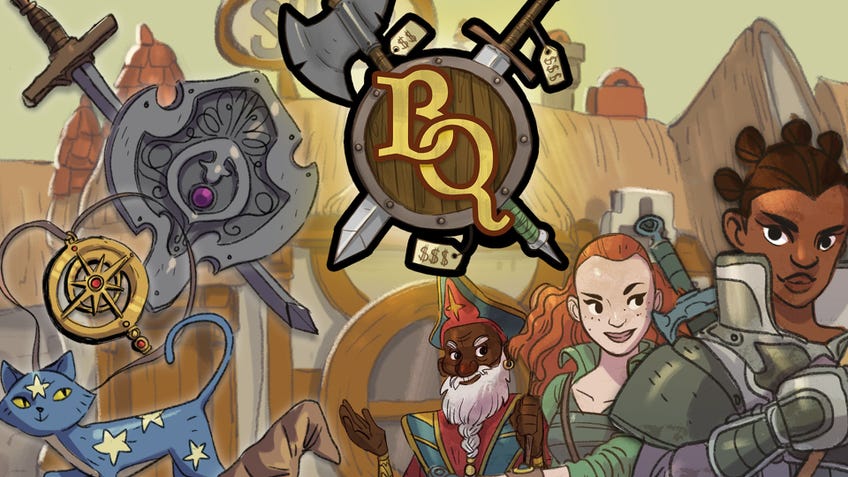Bargain Quest board game review - flashy fun in a fantasy world that struggles for depth
Dungeons & Dealers.
While we often follow the travails of local adventurers in the fantasy genre, rushing onwards into dark caves and epic castles, when do we stop and think of the humble village shopkeeper? That stalwart merchant packing potions, that reliable regular dealing out legendary weapons or that charlatan that does you over on not-so-enchanted gauntlets. It’s these folks, wielding hot deals and variable scruples, that you play in card game Bargain Quest. And in its oh-so-recognisable fantasy stock town, would-be heroes bring in most of the capital.
A perfectly portable box of fantasy-themed delights, Bargain Quest sits at that intersection between high-fantasy adventure and the sweet call of capitalism. It turns out that times rife with monstrous terrors do, in fact, make for brilliant business opportunities - if you’re the one selling, that is.
First, you’ll select your shop - options for which range from your standard fantasy barn conversion to a more steely sci-fi affair. This is your player board, folding outwards to reveal a unique, lovingly illustrated interior on which you’ll place your fresh wares - cards depicting a range of magical items.
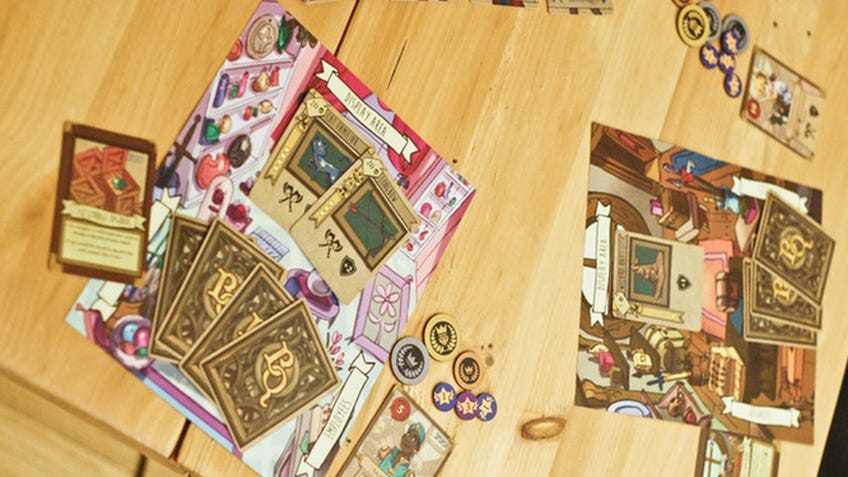
A thoroughly delightful experience - with the whimsical illustrations giving you a solid idea of what kind of shop you run - unveiling the player boards that represent your storefronts is one of Bargain Quest’s finest warm, fuzzy moments.
In-between the hawking and the fighting, you can also upgrade your shop, adding staff such as the handy Swindler, who literally robs heroes as they enter, and the Weaponsmith, who grants beefy boons to heroes of a martial class. This affords more choice and control to the players, making customising your shop one of the more interesting parts of Bargain Quest.
The game starts with the random selection of three monsters from three different tiers of difficulty. You’re dealt four cards each; you pick one, then pass the rest on facedown to the player next to you until the whole lot runs out.
It turns out that times rife with monstrous terrors do, in fact, make for brilliant business opportunities - if you’re the one selling, that is.
These are the cards you’ll place in your glittering display windows, lulling those unsuspecting adventurers in. You’ll have the choice to select something high value - that will attract a smaller range of potential customers, like a sword or shield - or something cheap and far-ranging, like a potion.
You’ll have to make some difficult decisions, choosing what to keep and what to pass on. This often adds a fun element - as the game goes on you can pick cards you know will upend your opponent’s strategy. At the same time, you might just end up getting good cards if you’re the first to draft.
Options for more budget-conscious patrons, such as the ‘fake’ potion or ‘cool’ goggles, are also available. There’s even an invisibility cloak that doesn’t actually exist. Luckily for the players’ humble merchants, there are no refunds.
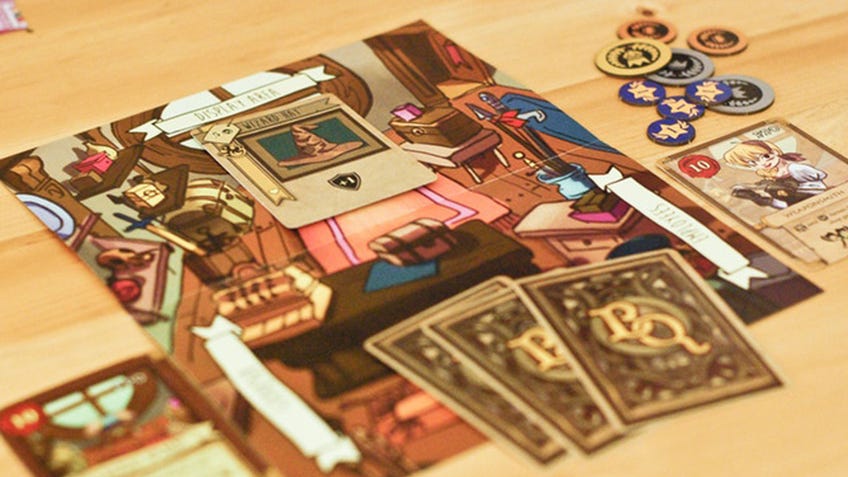
This is where Bargain Quest injects some life into those well-worn fantasy RPG tropes. Unlike the bulk of board games featuring a high-fantasy theme, it sports a decent sense of humour. Bargain Quest makes it very clear that you’re not here to save the town, but rather profit off of the adventurers that ride on through.
Once your shops are set up, you draw adventurer cards from a deck. Whoever has the highest-value item - depicted by a stack of hearts - in their shop window gets the first pick of adventurers, inviting them into their showroom. Each has a different stat block, granting varied attack and defense modifiers, and also requires different types of equipment. You won’t be selling any axes to a mage, for example.
Here’s the kicker: you won’t be able to sell what’s in your display. You might well lure the right adventurer through your front door, but that doesn’t mean you’ve necessarily got other goods they’ll want. This is where the strategy comes in, albeit light. Selecting the right products to draw in customers, while still having items available for purchase that make a profit.
As the draft is predominantly luck-based - namely, picking the most valuable items you can - this can be an unrewarding experience. If you draw badly, your odds of snagging someone to sell to are low.
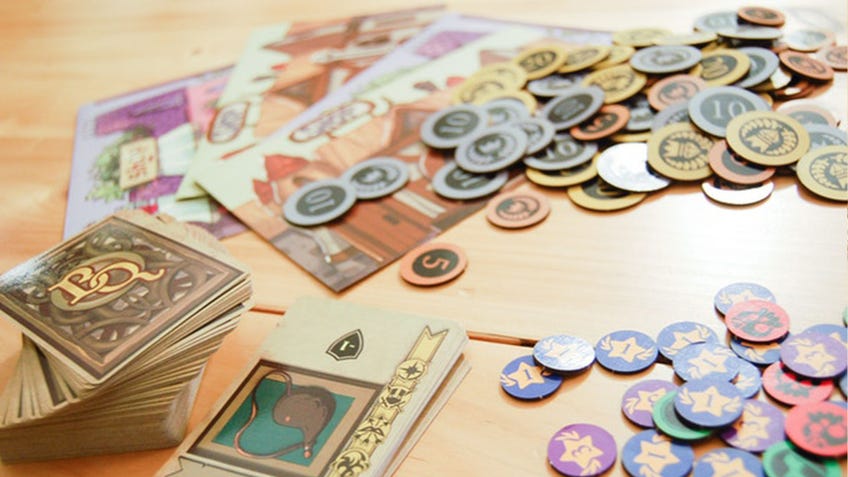
Your budding, often unfortunate patrons typically line up with your standard heroes - like your rogue, bard and cleric. They all have a unique trait, like the necromancer, who lets you summon up an old employee ( by totally wholesome means and not cursed and evil powers, for sure) from the discard pile. This adds a lot of thematic fun to proceedings, as myriad adventurers hinder and help players intermittently. Not all heroes are completely competent, either. The noble, for example, has loads of money but is utterly inept otherwise. Others can do as much damage as good, like the witch hunter - who has lots of money, but forces you to discard any magical items you have in your shop.
Luckily for the players’ humble merchants, there are no refunds.
After you’ve emptied the good heroes’ pockets, you draw another card that attributes a random trait to the adventurer. These range from traits like brave, which imparts an attack bonus, to hasty, which removes some of the hero’s defence modifier. This mechanic adds another bit of intrigue, as it can render a powerful adventurer rubbish and a useless one suddenly effective. It is however, yet another gameplay segment based entirely on luck.
Despite its apparent simplicity, Bargain Quest can be quite clunky and doesn’t zip along at the pace you’d expect. You find yourself forgetting the order of the stages as they seem so disparate. It can also be little jagged to set up, with its varied phases.
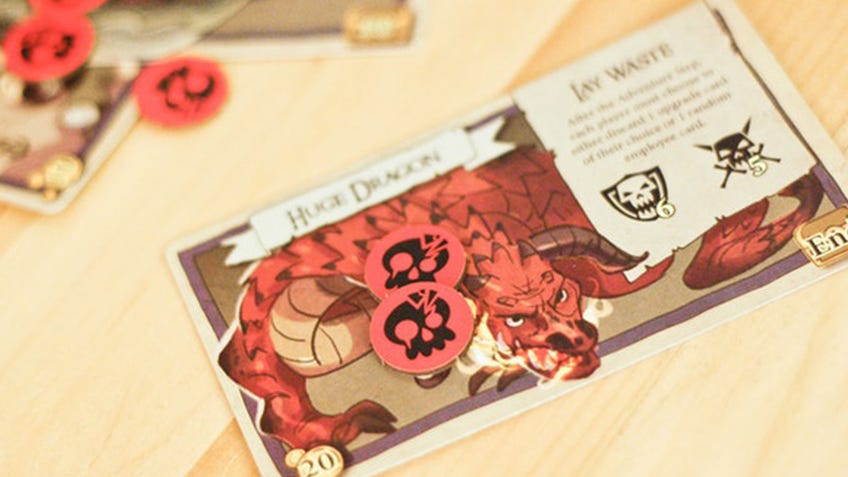
Thematically, though, Bargain Quest is really quite something. All these details add further narrative depth as you imagine your adventurers, frightened or very brave, running off to face the town’s local threat, be it a wicked witch, huge dragon or lich tyrant. Like the heroes, these villains each have unique traits that shake up proceedings a little.
After gearing up, your heroes fight the monster over a series of rounds. If they can survive the monster’s attacks and land a hit, there’s a victory point or two in it for you. This part of the game can be quite boring as you’re just playing out a predetermined setup for multiple rounds. The battle mechanics in Bargain Quest, of all its parts, could do with some more randomising.
Should your adventurer not make it back, you can still enjoy all that lovely gold they gave you. If they do make it out alive (huzzah!), they’ll be there in the next round, ready to get swindled all over again - this time with more gold lining their pockets.
At the end of three rounds and three defeated monsters, whoever has the most victory points - accrued through money and how effectively you deploy your heroes - wins. The entire process is repeated for a number of rounds, until all the monsters you’ve picked are wiped out. This can take anywhere from around 40 minutes to just over an hour.
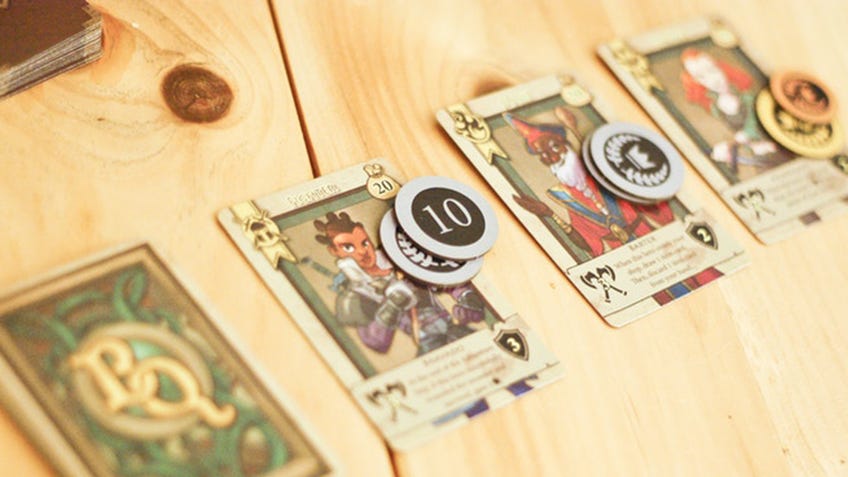
While each round effectively sees you doing the same thing, the variety of the game’s heroes, villains and wondrous items keeps the pace alive. That said, players looking for something where they take meaningful actions and deploy a strategy beyond “sell, sell, sell” and occasionally “rinse another vendor” are unlikely to be satisfied.
Should your adventurer not make it back, you can still enjoy all that lovely gold they gave you. If they do make it out alive (huzzah!), they’ll be there in the next round, ready to get swindled all over again - this time with more gold lining their pockets.
I enjoyed Bargain Quest, for its hefty theme, its humour and its beautiful artwork. Aesthetically, it stands in a league of its own. It has the rich colour of a Disney animation, combined with the sly expression of a graphic novel. It also depicts a diversity of characters that can be somewhat rare in board games; its heroes cover a range of genders, creeds and shapes, and none of them are, miraculously, given to skimpy outfits.
But its gameplay straddles a strange place. It’s too low-strategy and luck-driven for folks who enjoy slightly more tactical games but, with its numerous rounds and multitude of mechanics, it’s a little tough for beginner board game players too. The fun comes less from working out how to win and more in sharing the often cruel and sometimes ridiculous fate that befalls your customers or rival sellers. As such, it’s a relatively rules-light, portable game perfect for whisking on down to the local tavern and consumed with ample snackrifice.
Bargain Quest lacks strategic punch, but makes up for it with wry humour, beautiful components and its unabashed devotion to a diverse and silly world. It’s bright and funny enough to make its spin on fantasy tropes enjoyable. If you’re looking for atmosphere over depth, this purchase will serve you well on your next adventure.
